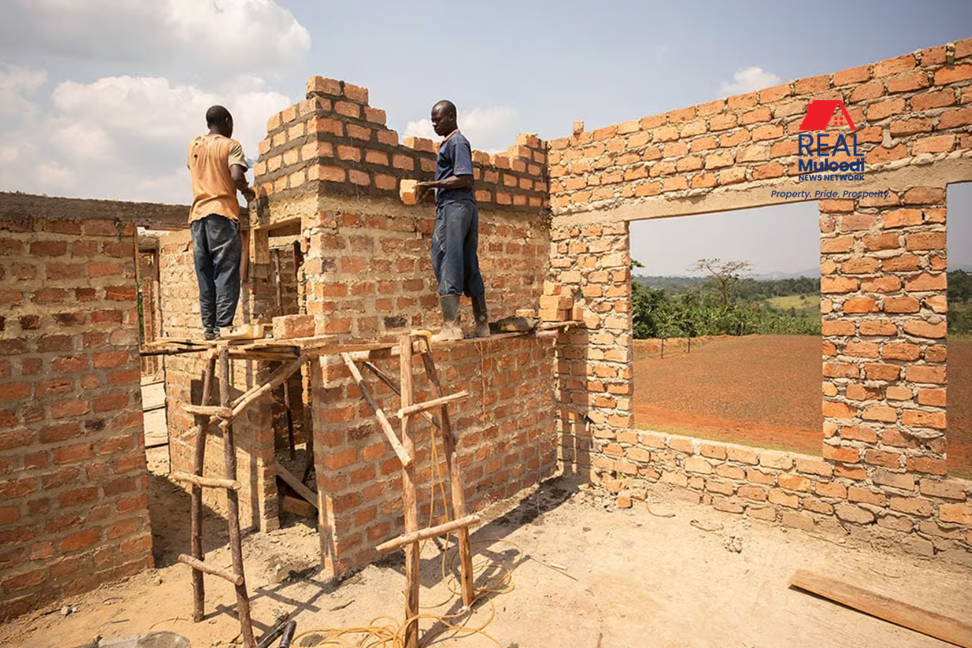UGANDA, Kampala | Real Muloodi News | Jonah Tusiime was fed up with paying rent and dealing with constant demands from his landlord. He made the decision to build his own house on a piece of land he inherited from his father, located in Nkumba on the Kampala-Entebbe highway.
Tusiime had a fairly decent job and USh4m in his bank account, and so began purchasing materials for the construction of his three-bedroom house.
Tusiime had hoped the construction process would take only six months, but he faced a two-year delay due to a lack of resources. However, he had reliable builders who knew exactly what to do, and if he had all the necessary resources, he could have finished the house in just five months.
Tusiime visited the site almost every day to ensure that the quality of the construction was up to his standards. Today, Tusiime is very proud of his house.
Average Time to Build
According to Julius Semanda, a civil engineer and lecturer at the Department of Construction Economics and Management, Makerere University, it should take approximately seven months, on average, from obtaining a building permit to completing a new single-family home. However, the time to acquire plans and get all the materials cannot easily be estimated due to the delays associated with such activities.
Semanda also explains that any building needs a solid foundation and this cannot be rushed.
“We take time to study the nature of the soil and if it is clay or sand, you need re-enforcements like a ground beam or a mesh,” Semanda explains.
When it comes to the super structure (the building or shell), Semanda says it can be hurried and built in the shortest possible time as long as the right materials are used by technically qualified people because they use the right material and mix it consistently. The roof must also be constructed commensurate to the building being constructed.
Francis Ssali Ssebutinde, an engineer, suggests that if the construction rules and regulations are followed, it can take between two to three months to build a bungalow house.
Ssebutinde advises that clients hire consultants to continue monitoring the work and determine the appropriate time frame for completion.
Experts suggest that the financial component is critical when it comes to the length of time it takes to build a house. Projects that have ready financing are likely to register the shortest time from planning, obtaining permission from relevant authorities to completion, in comparison with those that don’t have ready resources to finance them.
Another critical element is the person doing the job. In Uganda, owners often like to directly supervise their residential house construction, which often includes single-family houses and multi-family dwellings.
While site visits and oversight are beneficial and encouraged, inexperienced owners shouldn’t try to can’t replace experts. Inadequate experience can add to delays, therefore using specialised knowledge can be very beneficial since experts in various specialties can provide accurate estimates.
Other Factors that Delay Construction
Bureaucracy in plan and permit approvals, delayed payments, poor monitoring and control, high inflation and interest rates, and ignoring technical advice are some of the factors that can delay the process of completing the construction of a house on time.
Inclement weather, material and equipment shortages, equipment breakdown, and labour shortages can also impact the time it takes to build a house.
Variation orders and slow decision making by the owner to approve things like design documents or sample materials can further add to schedule delays.
Nevertheless, Ssali emphasises that finishing a house should not be rushed for whatever reason because it requires extra care. Otherwise, the person doing the work will not do an excellent job if they are under much pressure to finish. Even if it means going beyond the recommended time, all the necessary precautions must be taken because a house that would have lasted 50 years could end up standing for only 30 years.
To avoid potential issues, Ssali recommends frequent progress meetings and supervision, and the use of experienced subcontractors and suppliers.
Accurate initial cost estimates, the use of appropriate construction methods, and following recommended standards are also important, he says.
Taking Too Long Can Cost You
While many people who face cash flow problems during construction stop and start the building process as they raise the necessary funds, this can cost you significantly more money in the long-term.
The costs of construction are at the highest seen in 50 years owing to inflation, supply chain issues, labor shortages and other issues. The longer home builders delay their projects, the more building costs keep rising.
There are also time limits placed upon you by law. Under section 38 of the Building Control Act of 2013, a building operation must commence within 12 months from the date on which the Building Permit is issued and must be complete within a period of five years from the date on which the building operation commenced.
Where a person is unable to comply with the set time due to unforeseen circumstances, he/she must apply to the Building Committee for extension of the time within to complete the building operation.
A person who carries on a building operation beyond the prescribed time commits and offense and is liable on conviction to a fine not exceeding 500,000 shillings or imprisonment not exceeding 13 months. If an owner fails to heed the notice given, they may face a further fine not exceeding 100,000 shillings for each day on which the offence continues.
READ MORE LIKE THIS:
Building Owners Beware: A Demolition Permit is Required Before Razing a Structure
Building Fees and Permits: Know the Regulations and Requirements



